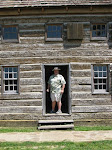 |
| Duke Ellington at the KFG Radio Studio, November 3, 1954 |
I discovered Ellington "late" most likely because I was immersed in his '40's sound at an early age and grew up thinking there was nothing new. He was born in Washington, DC in 1899 and spent his early career there while learning his trade. He wrote what he called "American music," a unique blend of his creative genius and elements of jazz, blues, classical, swing, bop, and popular song. Ellington appealed to a wide audience, but the appeal was compartmentalized and so broad that you would be hard pressed to find someone who liked everything he composed. I think the one element that unified his work was elegance. Early on, that came from his training as a pianist and was bolstered later by impressionistic classical influences. Also, much of that elegance came from his long-time association with the classically trained composer, arranger and pianist, Billy Strayhorn.
I took a special interest in Ellington when I began listening to the music of the British composer, Frederick Delius. Delius's music left me spellbound then. It was rich, melodic, and complex. Later I learned it was so much that it is considered some of the most difficult music to realize in the classical catalog. As early as the 1880's, his compositions incorporated motifs and melodies from the songs of ex-slaves working on the orange plantations he managed along the St. Johns River in Florida. Those musical themes would appear frequently throughout his career. Ellington had similar interests and it would be quite natural that he would appreciate Delius. In fact the appreciation and influence was so deep that Ellington eventually composed and recorded a tribute - In A Blue Summer Garden - to Delius.
Today we commemorate the legendary Duke Ellington on what would be his 116th birthday. Here are two of Ellington's finest moments. The first one is universally recognized and comes from the orchestra near its peak in the early '40s. The second, from 1965, is lesser known but still full of all the magic the master and his orchestra possessed.
We end with a historic moment in jazz history: Duke Ellington and his orchestra at the 1956 Newport Jazz Festival. Jazz was changing from a dance band to smaller ensemble format and at the same time competing with the rise of rock and roll. Ellington decided to link two compositions with a free-wheeling sax solo. Many jazz historians agree that this was a landmark performance that not only gave the band concept renewed life but also gave jazz a new and expanded direction in sound and listener experience.

No comments:
Post a Comment